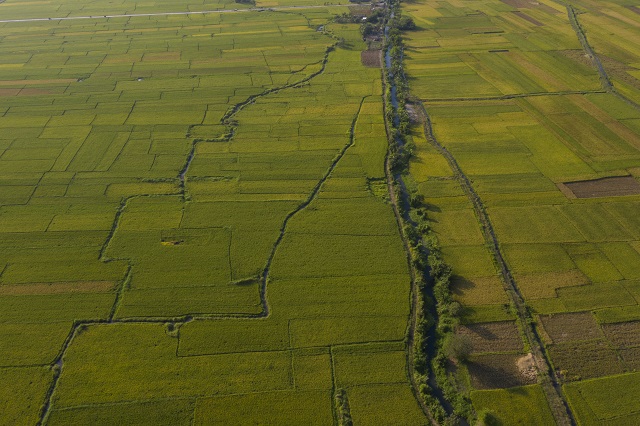
Farmer-recipients of inbred certified seeds from the Rice Competitiveness Enhancement Fund (RCEF) – Seed Program are reporting higher harvests and additional income for the first half of the year.
A survey by the Socioeconomics Division (SED) of Philippine Rice Research Institute (PhilRice) showed that rice yield of more than 4,000 farmer-beneficiaries in 55 provinces averaged 4.14t/ha.
Dr. Jesusa Beltran, SED head, said that the harvest is higher by 0.44t/ha than the baseline yield of inbred seed users in the 2019 dry season.
The yield increment, valued at an average price of P17/kg, translates to almost P7,500/ha additional income per farmer-recipient, which helps them cope with the financial slash brought about by the COVID-19 pandemic.
The Department of Agriculture (DA)-PhilRice survey, conducted through phone interview, also showed that more than half of respondents gained access to information materials circulated during seed distribution. About 97% of them reported that these helped improve their knowledge in rice farming.
Survey results were released following the recent Philippine Statistics Authority (PSA) report showing that first-semester palay production had increased from 8.27 million tons in 2019 to 8.39 million tons in 2020.
Dr. Flordeliza Bordey, the Institute’s RCEF Program Management Office Director, said that yield mainly drove this year’s rice production growth in the first semester.
“Though still short of our peak yield in 2018, the observed yield recovery offsets the effect of the shrink in rice area harvested,” she emphasized.
For DA’s part, Sec. William Dar said the department had been intently monitoring the progress of RCEF implementation.
“We have been on our toes since last year, squarely confronting all challenges in the implementation of the Rice Tariffication Law, especially those on RCEF. We acknowledge the ‘birth pains,’ but we are now reaping the benefits, accruing to our farmer-beneficiaries. There’s no better way to tell the stories than to come from farmers themselves,” Dar said.
“We will continue to monitor, document, and share these farmers’ stories to inspire millions of their counterparts nationwide; faithfully serving them all as we conscientiously implement RCEF program components in the succeeding years through 2025,” the servant-leader added.
Rice grower Teodolfo Gindap of Barbaza, Antique gained his highest yield in his 20 years of farming thru the program that doubled his harvest to 3.8t. He used to harvest 1.5t from his 0.75ha even with good irrigation.
Gindap, who is enlisted in the Registry System for Basic Sectors in Agriculture (RSBSA), also saved P3,000 from the distributed seeds.
“Seeds from the program are good choices because they are of high quality. This wet season, I planted NSIC Rc 402 – a new, early-maturing variety,” he said.
From March to August 2020, the program has delivered more than 2.4M bags for about 884,000 farmers.
“With more farmers reached this wet season, a more positive outlook in rice production is expected this second semester under favorable weather,” Bordey said.
Other than yield increase, program implementers also noted renewed farmers’ confidence to continue producing rice.
Flaviano Dator, president of Samahan ng Magpapalay ng Lucban in Quezon, used to describe farming as an unprofitable livelihood before the RCEF-Seed Program.
“Farm inputs including seeds are expensive, trapping many farmers in debt. But with the provision of free certified inbred seeds, farmers can save at least P1,500 per hectare, which motivated us to plant anew,” he said.
The RCEF-Seed Program is a component of Republic Act 11203 or Rice Tariffication Law, which was sponsored by Sen. Cynthia Villar, supported by the House of Representatives, and signed by Pres. Rodrigo Duterte. It allots a P10 billion fund every year for the rice farmers. The program is a 6-year government initiative to help the farmers defend themselves against open competition from the international rice market.
DA-PhilRice leads the implementation of the RCEF-Seed Program in partnership with the Department of Agriculture and Local Government Units. It also co-implements the RCEF-Rice Extension Services Program along with the Agricultural Training Institute, Technical Education and Skills Development Authority, and Philippine Center for Postharvest Development and Mechanization.




